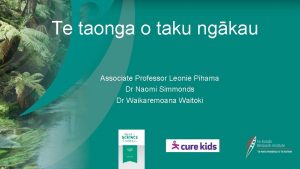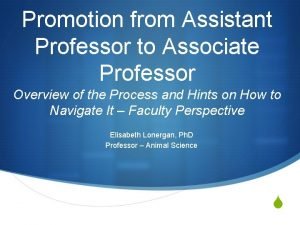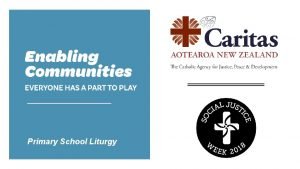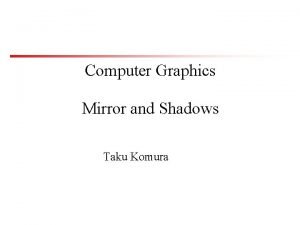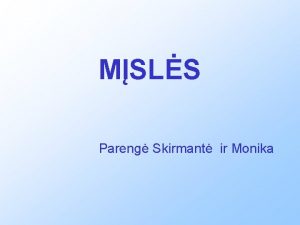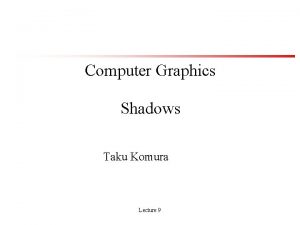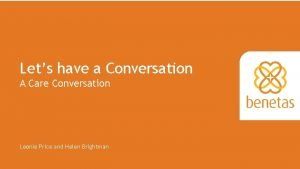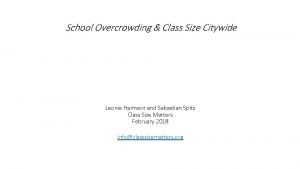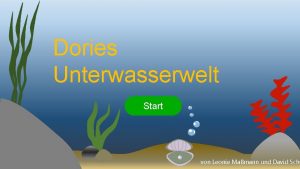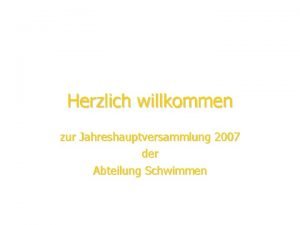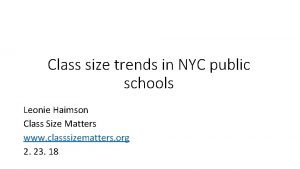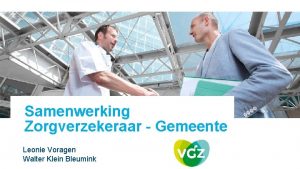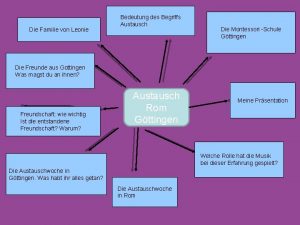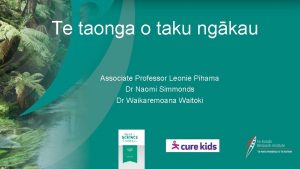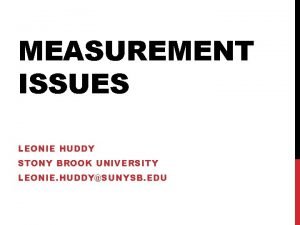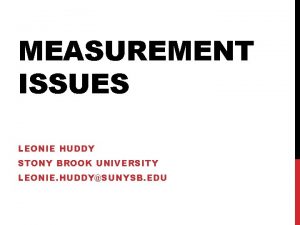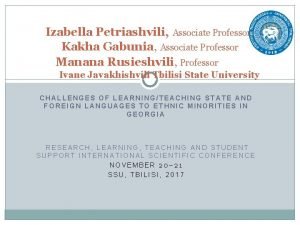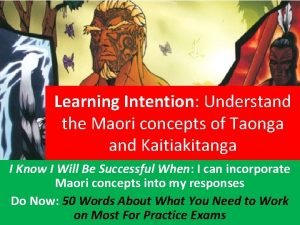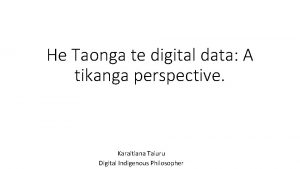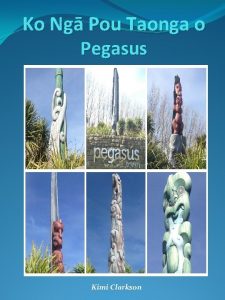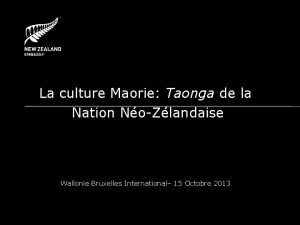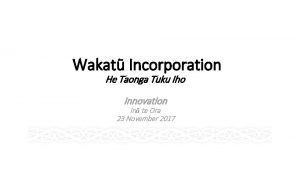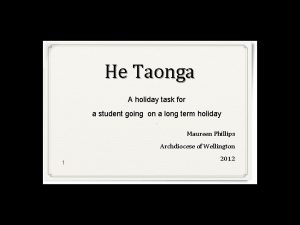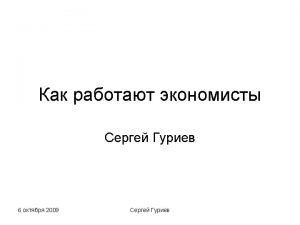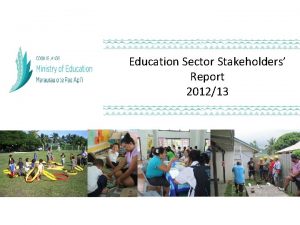Te taonga o taku ngkau Associate Professor Leonie












![Te taonga o taku ngākau [It’s] about how tamariki and mokopuna, our children are Te taonga o taku ngākau [It’s] about how tamariki and mokopuna, our children are](https://slidetodoc.com/presentation_image_h2/3f16fd35054d141e7c99f54b20a39df8/image-13.jpg)

- Slides: 14

Te taonga o taku ngākau Associate Professor Leonie Pihama Dr Naomi Simmonds Dr Waikaremoana Waitoki

‘Te taonga o taku Ngākau’ investigates ways that Māori knowledge about raising our children can be used to develop prevention and intervention tools to support tamariki and whānau who are experiencing mental health issues.

• Tikanga, Te Reo, Mātauranga critical for tamariki & whānau ora • Whānau is not the problem it is the solution • Whānau is defined by Māori not agencies • Tamariki wellbeing sits in the context of whānau wellbeing • Collective responsibility, accountability, obligations, connectedness • Communication and collective problem solving • Te Pā Harakeke: Intergenerational • Issues of government/agencies failure to support whānau

Kaupapa Māori • Tino rangatiratanga (the self-determination principle) • Taonga tuku iho (the ‘cultural aspirations’ principle) • Ako Māori (the ‘culturally preferred pedagogy) • Kia piki ake i ngā raru o te Kainga (the ‘socio-economic’ mediation principle) • Whānau (the ‘extended family structure ‘ principle) • Kaupapa (the ‘collective philosophy’ principle)

Whānau My concept of whanau I probably draw upon from my own, which is quite intergenerational but also not just whakapapa by blood, but whakapapa by upbringing and support. So I have a whangai sister who is no less my sister, for example, than my birth sister and her children are no less my iramutu than my own biological sibling’s children. So within my own whanau context there is my parents, all of their parents have passed on now but like myself and my siblings and their partners and all of our children are very much a part of each other’s lives. So when I talk about whanau I immediately think about the context of my own, which is not just me, husband or children. My whanau is me, my biological siblings, my siblings – who by the way are divorced and have married again and have divorced again, but they are still a cohesive subsystem as parents with a narrowing whanau context. Then of course we have cousins, some of which are third cousin twice removed, but have grown up entrenched within our whanau system, so they are cousins and they are probably not even as close as some other ones, but they are a part of the whanau unit.

Tino Rangatiratanga What I am trying to do is transform for example the entire economic model that has dominated us for centuries, generations around the world it's colonialism, it's imperialism but it's a framework that puts individuals against individuals and against the environment and te taiao and Papatūānuku in the interests of profit and power to the few and so if we are really, if we really are concerned about addressing what we need to have to ensure that we have well tamariki it would be a model of tino rangatiratanga and mana motuhake that transfers that power back to community and whānau in a way that safe guards us from an oppressive model that concentrates wealth and power in the hands of a few for me that's at the core of what we need and we have to continue to aspire for true tino rangatiratanga.

Tino Rangatiratanga : Dealing with systemic issues But we just have to go knock on the door of Oranga Tamariki to go – hey, you got some of our kids? I said we don’t have to go far to know, to find where those lost kids, or you know kids who have been taken out of their homes are, because there are CYFS sites or Oranga Tamariki sites everywhere. I think that is the antithesis of collective responsibility of whanau, hapu, Iwi… That is not that I blame us as a people, I mean – come on, colonisation, case and point. But at the end of the day who is going to love these tamariki mokopuna more than us? Sure as hell not the system.

Ako Māori So I will talk about the three things that we encourage in my home that I know was important mātauranga that my grandmother passed onto me. So I talk to my children about kia māia, kia mohio - to be learned. I want to make sure that you can be learned and be learning about the things that you need to know in this world so that you can thrive. Kia manaakitanga. Yea so, those are three principle that have been well embedded in my whanau.

Taonga tuku iho I also use the whakataukī whāia te iti kahurangi, ki te tuohu koe me he maunga teitei, let everybody aspire to their highest aspirations, it's very important and if you do bow down let it be to the highest mountain only but also the whakataukī we have about ehara taku toa i te toa takitahi engari he toa takitini, the collective strength is really important rather than thinking about individual achievement. To me it means that in itself is that again our tūpuna saw children are not just the responsibility of mum and dad, that any and all members of whānau can support each other and their tamariki and if we see that we can help or someone might need our help, we can offer that and sometimes in our whānau that might of meant fairly strongly suggested, not just you know, oh well that's their child, their business. Our siblings, children, our grandchildren is everybody’s business and it’s everybody’s business to share their thoughts, their wisdom and their support when and where they can and we do that as a whānau.

Kia piki ake i ngā raru o te Kainga From my experience and working with whānau there are lots of things that are, I call them sitting on their shoulders, so that's why the taumahatanga is definitely on their shoulders. It's things like wealth, housing, health, all of those key things, education, all of those key things that in days gone by our whānau weren't wanting for any of those things i ngā rā o mua, but historical pressures that have been placed on our people especially around taking our language, taking our culture, taking our identity, sticking it inside pieces of legislation that kill it basically.

Kia piki ake i ngā raru o te Kainga I think big issue to be addressed is always around poverty because that's just massive for our people cause if people are battling with just paying the bills or they have got to be working three or four jobs and they haven't got time to be together as a whānau to go to kōhanga reo or to go to learn te reo or whatever that's really hard and stressful and a lot of people are also dealing with, so those are the effects of colonization as well on our people and the traumas that are passed down intergenerationally I think that needs to be addressed

Kaupapa We have so many things in so much of our mātauranga Māori about our tamariki being the rito of that harakeke and all the tikanga about harakeke says that nothing can be harmed with that, that tamaiti and that close whānau around it, our mōteatea tell us this. We've got that whole, I don't know who it was that said it, one of those early missionaries who said, spare the rod, spoil the child kind of stuff and we never had any of that before so, so much of it I think is the issues around those colonization and the impact that it's had and now it's swung so far the other way where we occupy some of those west statistics of things that we would never have traditionally done so there must be something in that about wellbeing
![Te taonga o taku ngākau Its about how tamariki and mokopuna our children are Te taonga o taku ngākau [It’s] about how tamariki and mokopuna, our children are](https://slidetodoc.com/presentation_image_h2/3f16fd35054d141e7c99f54b20a39df8/image-13.jpg)
Te taonga o taku ngākau [It’s] about how tamariki and mokopuna, our children are an absolute invaluable treasure, you know if you want to put that way, closest to our hearts. I know it says te taonga o taku ngākau but I always think about, as well, he taonga tuku iho, they are a gift that we are privileged to be allowed to raise and have them, that they have chosen to come to us.

 Te taonga o taku ngakau
Te taonga o taku ngakau Promotion from assistant to associate professor
Promotion from assistant to associate professor Ehara taku toa i te toa takitahi translation
Ehara taku toa i te toa takitahi translation Taku graphics
Taku graphics Vaiksciojo panele po pievele
Vaiksciojo panele po pievele Equal height equal light
Equal height equal light Leonie price
Leonie price Leonie haimson
Leonie haimson Leonie maßmann
Leonie maßmann Leonie thierfelder
Leonie thierfelder Leonie tensen
Leonie tensen Leonie voragen
Leonie voragen Leonie koerhuis
Leonie koerhuis Leonie cornips
Leonie cornips Leonie bedeutung
Leonie bedeutung
